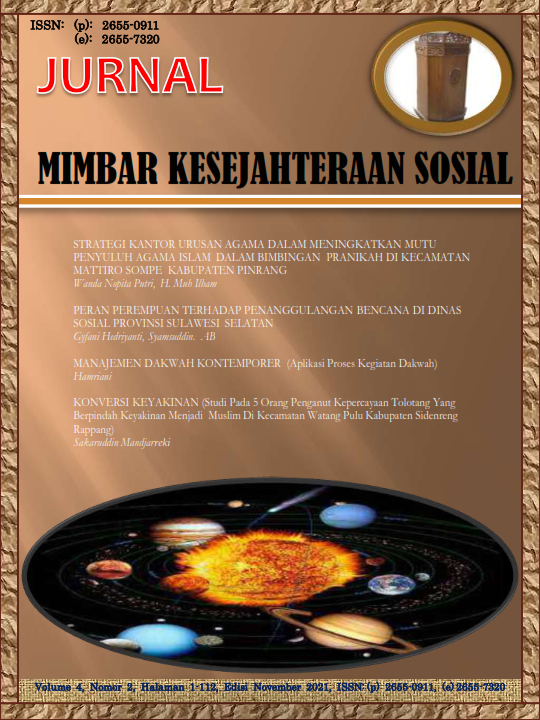KONVERSI KEYAKINAN
Studi Pada 5 Orang Penganut Kepercayaan Tolotang Yang Berpindah Keyakinan Menjadi Muslim Di Kecamatan Watang Pulu Kabupaten Sidenreng Rappang
Abstract
This study intends to explore the reality of religious conversion regarding the underlying determinants and religious life of converts after religious conversion. This research is qualitative with a phenomenological approach to reveal the subjective experience of conversation. The purpose of this research is to find out; (1) the determinant factors behind so that the subject converts to religion, and (2) the subject's religious life as seen from religious knowledge, religious understanding, and the subject's commitment to the new Islamic religion. The results of the study show that: (1) The determinant factors behind the conversion of converts to religion are marriage. His religious conversion was not only a consequence of the
constitutional mandate regarding the obligation to marry with the same belief (Marriage Law No. 1 of 1974, Article 2), but also because it was based on mutual attraction (likes). (2) The religious life of the subject after religious conversion shows positive results in terms of dimensions; (a) Knowledge of converting Islamic religion is increasing day by day due to things such as; there is a desire to learn independently through the religious text books he obtained, the husband's guidance and religious guidance carried out by extension workers from the Office of Religious Affairs (KUA) of Wattang Pulu District which take place periodically and continuously; (b) The practice of converting Islam in daily life is also increasing along with the more advanced knowledge gained about Islam; (c) Conversational commitment to Islam is very strong, which is indicated by the increasing stability in Islam and the inclusion of several other family members in Islam through their influence. The implications of this research include; (1) Islamic guidance is needed by the Government of Sidenreng Rappang Regency, especially the Office of Religious Affairs (KUA) of Wattang Pulu District for converts in a planned, comprehensive and sustainable manner. (2) A social attitude that is more inclusive, tolerant, and full of brotherhood is needed towards converts to Islam in order to present a more harmonious and cohesive atmosphere of social life.
